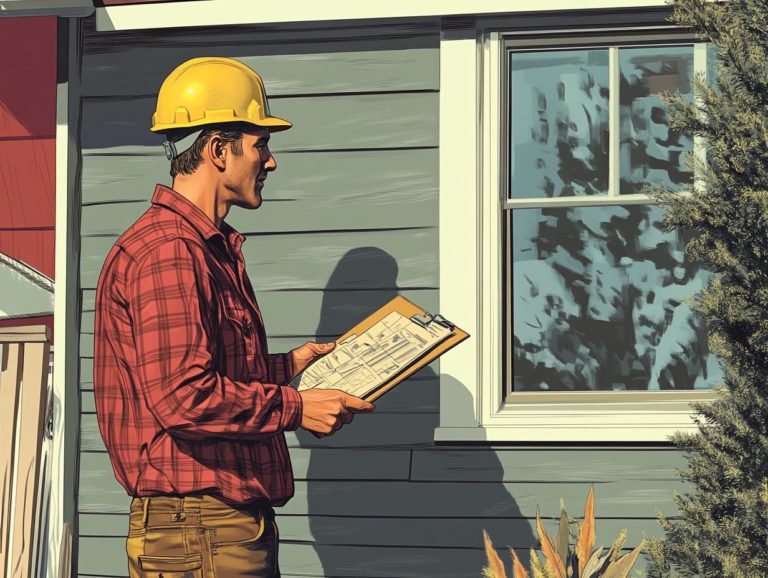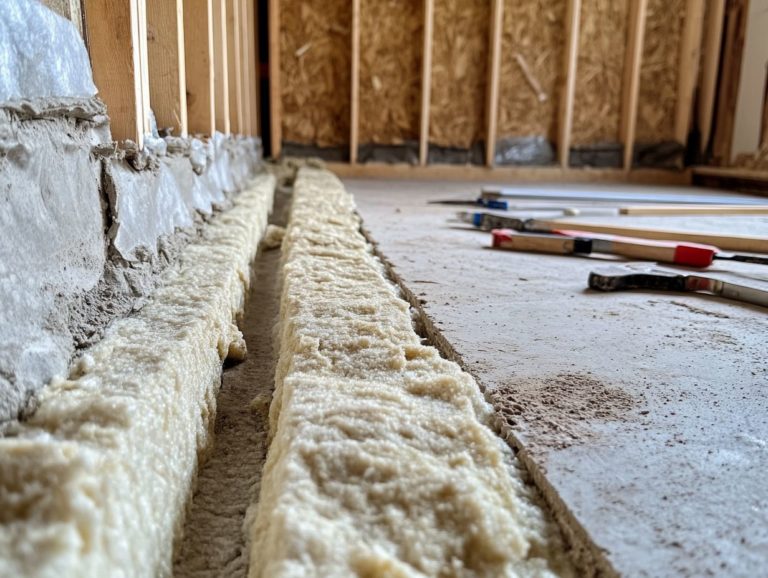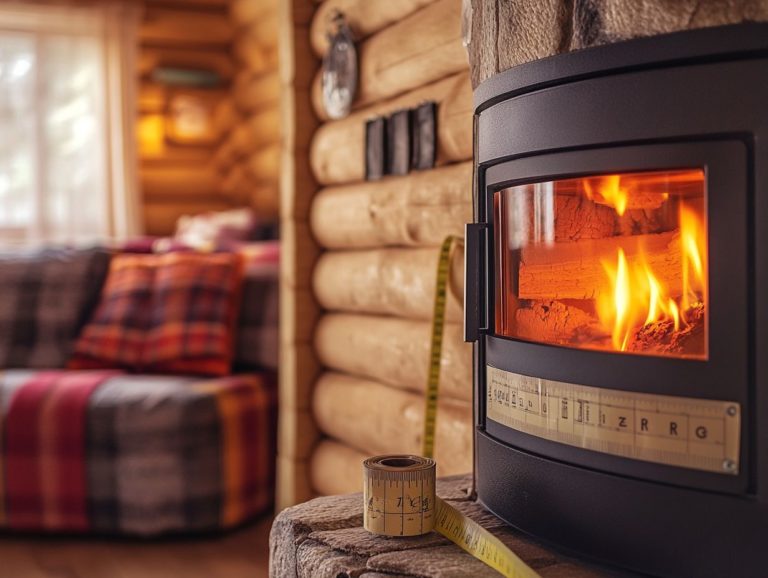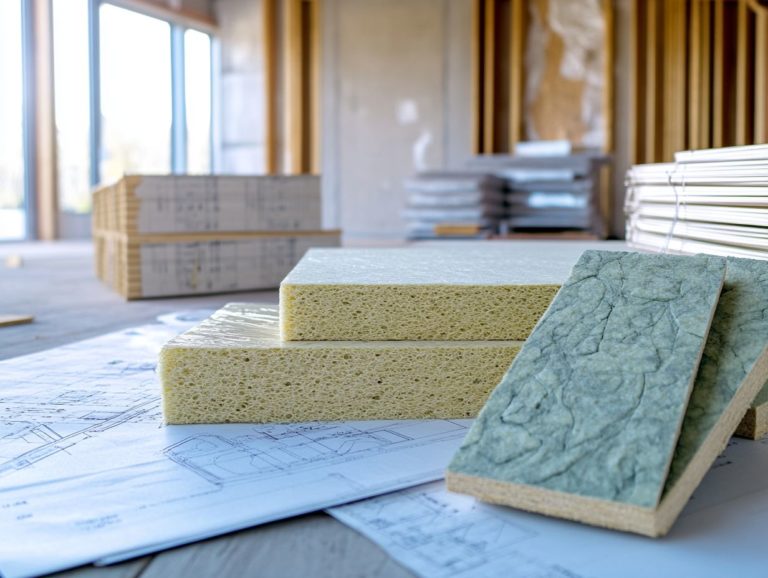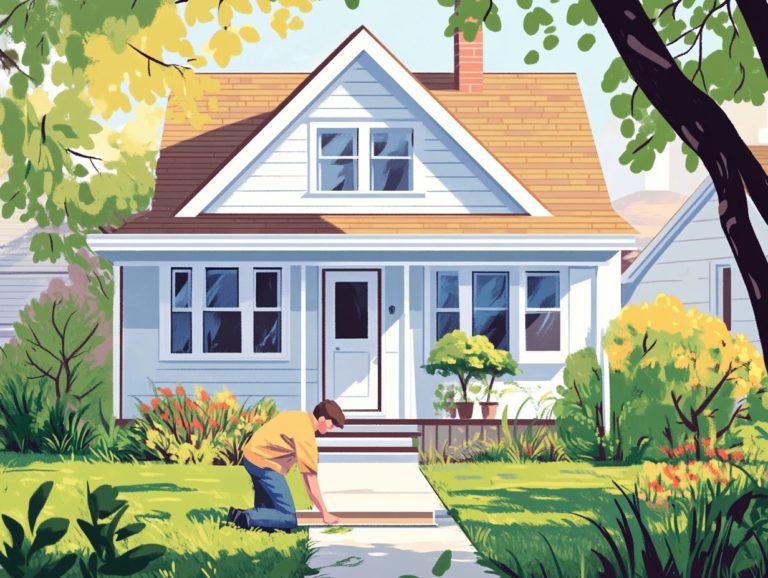How Proper Insulation Can Benefit Your Health
Proper insulation is not just about keeping your home comfortable; it significantly influences your overall health and well-being.
Enhancing indoor air quality and minimizing the risk of mold are just a couple of the many benefits that come with adequate insulation. These advantages extend well beyond mere energy efficiency.
This article delves into the various types of insulation available and their effectiveness, along with how you can identify and improve the insulation in your own home.
You won’t want to miss out on these essential tips for maintaining a healthy living environment.
Explore how making informed choices about insulation can lead to a healthier, cozier home.
Contents
- Key Takeaways:
- The Importance of Proper Insulation
- Health Benefits of Proper Insulation
- Types of Insulation and Their Effectiveness
- How to Ensure Proper Insulation in Your Home
- Tips for Maintaining a Healthy Home
- Frequently Asked Questions
- What is insulation and how does it affect my health?
- How does proper insulation improve indoor air quality?
- Can proper insulation help lower my energy bills?
- Does insulation help reduce noise pollution?
- How can proper insulation prevent moisture-related health issues?
- What are some signs that I may need to improve my home’s insulation?
Key Takeaways:

Proper insulation plays a crucial role in maintaining a healthy living environment in your home. It can improve indoor air quality, reduce the risk of mold and mildew growth, and lower energy bills. For more details, consider understanding the importance of insulation, as regularly checking and improving it can lead to significant health benefits and cost savings in the long run.
The Importance of Proper Insulation
Proper insulation is essential for achieving energy efficiency in buildings. It profoundly influences your energy costs while minimizing emissions that contribute to environmental challenges.
Insulation prevents moisture condensation, which can lead to structural damage and health concerns, while also enhancing noise control.
When you opt for certified insulation materials, like spray foam insulation, you re making a wise investment. These materials ensure optimal performance of mechanical equipment, improve indoor air quality, and provide vital protection against fire hazards and health risks tied to inadequate insulation.
Understanding the Role of Insulation in Homes
Insulation plays a pivotal role in your home by regulating indoor temperatures and enhancing energy efficiency. When installed correctly, it minimizes heat transfer, ensuring that your heating and cooling systems operate efficiently. This can lead to reduced energy consumption over time.
Integrated insulation influences the overall effectiveness of your HVAC systems. A higher insulation effectiveness, or R-value, often correlates with lower utility bills, as your systems won t have to work as hard to maintain your desired temperatures.
You have a range of insulation types to choose from, including:
- Fiberglass: Cost-effective and widely used.
- Foam board: Provides excellent thermal resistance.
- Spray foam: Offers superior air sealing that enhances indoor air quality.
Each option brings its unique advantages. For example, while fiberglass is budget-friendly, spray foam drastically improves indoor air quality by reducing drafts and potential pollutants from outside, creating a healthier environment.
Health Benefits of Proper Insulation
Proper insulation not only enhances your energy savings but also provides significant health benefits. It creates a more comfortable and healthier living environment while effectively preventing moisture-related issues like mold growth that can compromise your well-being. Considering the benefits of sustainable insulation solutions can further improve your home’s efficiency and safety.
Improved Indoor Air Quality
Improved indoor air quality stands out as one of the key health benefits of proper insulation. It minimizes the entry of outdoor pollutants while maintaining stable temperatures.
By establishing a well-sealed barrier, effective insulation curbs the infiltration of dust, pollen, and other allergens, reducing the chances of mold and moisture buildup. This control over airborne contaminants is essential for enhancing your living space’s overall comfort and supporting better respiratory health.
With fewer irritants present, you can enjoy a significant reduction in allergy flare-ups and respiratory issues. Ultimately, the right insulation lays the groundwork for improved well-being, allowing you to breathe easier and live more comfortably.
Consider checking your home insulation today or reaching out for professional help to ensure that you re maximizing the benefits of proper insulation!
Reduced Risk of Mold and Mildew

Proper insulation lowers the risk of mold and mildew by managing moisture levels in your walls and attics. When installed correctly, it keeps humid air out, a key factor in mold growth.
Effective insulation maintains optimal temperatures and prevents condensation. This protects your building s structure and improves indoor air quality, helping you avoid health issues related to mold, like respiratory problems and allergies.
Investing in quality insulation preserves your property s health and creates a safer living environment for you and your loved ones.
Lower Energy Bills
One immediate benefit of proper insulation is a significant drop in energy bills. Insulation helps your heating, ventilation, and air conditioning (HVAC) systems run more efficiently.
By keeping a consistent indoor temperature, insulation reduces the strain on your HVAC systems. You could see a 20% drop in heating costs during winter and up to 15% savings on cooling in summer.
These savings add up, providing long-term financial benefits.
Good insulation not only saves energy but can also increase your property value and attract buyers, making it a smart investment.
Types of Insulation and Their Effectiveness
Understanding the different types of insulation is crucial for making informed decisions that boost energy efficiency and comfort in your home.
Comparing Different Types of Insulation
When comparing insulation types like spray foam, fiberglass, and cellulose, it’s important to know their energy efficiency and uses. Each type has its own pros and cons that can impact your building s performance.
For instance, spray foam excels in air sealing and has a high R-value, making it ideal for attics and irregular spaces. However, installation can be labor-intensive and costly.
Fiberglass is budget-friendly and easy to install but may require a vapor barrier to manage moisture. Cellulose is eco-friendly but may settle over time, which can reduce its effectiveness.
Evaluating these options helps you find the best insulation solution for your needs.
How to Ensure Proper Insulation in Your Home
Ensuring proper insulation in your home means being aware of signs of inadequate insulation. Taking proactive measures can prevent moisture buildup and structural damage.
Signs of Inadequate Insulation

Signs of inadequate insulation include rising energy costs, drafts, and moisture accumulation. You might notice temperature differences between rooms, where some spaces feel uncomfortably hot or cold.
This inconsistency disrupts comfort and indicates that your HVAC system is working harder, leading to higher bills. If you see condensation on windows or walls, it may signal poor insulation, creating a breeding ground for mold.
Being alert to these signs allows you to address insulation issues quickly, saving you money and improving your home s efficiency.
Steps to Improve Insulation
Improving your insulation has many options. Start with certified materials like spray foam, known for their energy-saving benefits.
Consider fiberglass batts or blown-in cellulose. These options allow for easy DIY solutions with just a few tools.
For a more hands-off approach, hire professionals to ensure every nook is insulated. This includes attics and basements for the best performance.
These improvements can significantly reduce your energy bills. They also create a comfortable living space by minimizing drafts and keeping temperatures steady.
Better insulation enhances indoor air quality. It protects your health by reducing moisture that can lead to mold and allergens.
Tips for Maintaining a Healthy Home
A healthy home needs attention to many elements. Proper insulation is critical for regulating indoor air quality and moisture levels.
This care enhances comfort and protects your well-being. Create a sanctuary that nurtures your lifestyle.
Other Factors for a Healthy Living Environment
In addition to insulation, consider moisture control, air quality, and energy efficiency. All these factors contribute to a healthy living space.
Good ventilation is essential. It helps reduce indoor pollutants and promotes fresh air circulation.
Energy-efficient appliances lower utility bills and minimize your carbon footprint. This allows for a more sustainable lifestyle.
Regular maintenance, like checking for leaks or servicing HVAC systems, is crucial. This ensures all elements work effectively for your health and home longevity.
By considering these aspects, you can create a welcoming space that enhances your quality of life.
Frequently Asked Questions
What is insulation and how does it affect my health?

Insulation is a material that prevents heat or sound from moving between areas. It keeps your home comfortable and reduces noise for a peaceful environment.
How does proper insulation improve indoor air quality?
Proper insulation stops air leaks that let in pollutants and allergens. This leads to better air quality and can improve respiratory health.
Can proper insulation help lower my energy bills?
Yes, good insulation enhances temperature control. This means your heating and cooling systems work less, saving you money on energy bills.
Does insulation help reduce noise pollution?
Yes, insulation absorbs sound, reducing noise from traffic and neighbors. This creates a quieter, more peaceful environment, benefiting your mental health.
Insulation helps manage humidity levels in your home. This prevents excess moisture that can cause mold and respiratory issues.
What are some signs that I may need to improve my home’s insulation?
Look for drafts, uneven temperatures, high energy bills, or excess noise. Regularly check your insulation for wear and damage.


